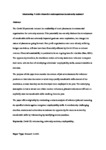Volunteering: A viable alternative work experience for university students?
| dc.contributor.author | Evans, Carl | |
| dc.contributor.author | Yusuf, Z | |
| dc.date.accessioned | 2022-01-28T10:16:34Z | |
| dc.date.issued | 2022-04-23 | |
| dc.identifier.issn | 0950-4222 | |
| dc.identifier.issn | 2043-6858 | |
| dc.identifier.uri | http://hdl.handle.net/10026.1/18623 | |
| dc.description.abstract |
<jats:p> The Covid-19 pandemic reduced the availability of work placements in commercial organisations for university students and potentially changed the nature of placements in the future. Similarly, charitable organisations who were already suffering budget restrictions have been financially affected by Covid-19 due to reduced revenue on trading activities, with financial sustainability predicted to be an ongoing issue. The opportunity, therefore, for charities to entice university students to volunteer to support their work, with the lure of developing their employability skills, seems irresistible at this time. The purpose of this paper is to examine the content of job advertisements for volunteer positions to determine the extent to which they specify transferable skills desired of the candidates, or state that they can be developed once employed in the post. The underlying assumption is that, to attract student volunteers, job advertisements will need to explicitly state the transferable skills resulting from the post, since students will be focused on developing employability skills through the volunteering activity to support their graduate careers. The paper offers originality by conducting a content analysis of volunteer jobs and assessing the specified criteria against recognised employability skills. It concludes by challenging charities, students and universities to embrace the opportunity for students to develop transferable skills through volunteering by modifying current practices. </jats:p> | |
| dc.format.extent | 110-120 | |
| dc.language | en | |
| dc.language.iso | en | |
| dc.publisher | IP Publishing | |
| dc.title | Volunteering: A viable alternative work experience for university students? | |
| dc.type | journal-article | |
| dc.type | Journal Article | |
| plymouth.issue | 1 | |
| plymouth.volume | 37 | |
| plymouth.publication-status | Published | |
| plymouth.journal | Industry and Higher Education | |
| dc.identifier.doi | 10.1177/09504222221093180 | |
| plymouth.organisational-group | /Plymouth | |
| plymouth.organisational-group | /Plymouth/Faculty of Arts, Humanities and Business | |
| plymouth.organisational-group | /Plymouth/Faculty of Arts, Humanities and Business/Plymouth Business School | |
| plymouth.organisational-group | /Plymouth/Users by role | |
| plymouth.organisational-group | /Plymouth/Users by role/Academics | |
| dcterms.dateAccepted | 2021-12-22 | |
| dc.rights.embargodate | 2022-6-9 | |
| dc.identifier.eissn | 2043-6858 | |
| dc.rights.embargoperiod | Not known | |
| rioxxterms.versionofrecord | 10.1177/09504222221093180 | |
| rioxxterms.licenseref.uri | http://www.rioxx.net/licenses/all-rights-reserved | |
| rioxxterms.type | Journal Article/Review |


